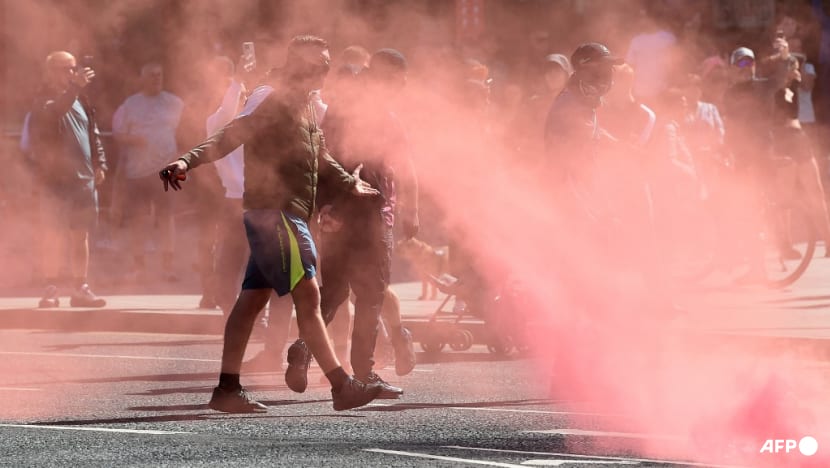Commentary: Why UK riots over Southport child stabbings matter to Singapore
The recent violent unrest in the United Kingdom is a stern reminder for Singapore not to take peace and stability for granted, says Black Dot Research’s Nicholas Fang.

Protesters throw flares towards police officers in Liverpool on Aug 3, 2024 during the Enough is Enough demonstration held in reaction to the fatal stabbings in Southport on Jul 29. (Photo: AFP/Peter Powell)

This audio is generated by an AI tool.
SINGAPORE: The recent tragic stabbing of three young girls at their dance class in the quiet seaside town of Southport in northern England triggered some of the worst unrest the United Kingdom has seen in more than a decade.
Beyond the initial tragedy, which also saw eight more children and two adults injured, the riots and violence in towns and cities across England and Northern Ireland were fuelled by a potent combination of complex and volatile factors.
These included online misinformation and disinformation, anti-immigration and anti-foreigner sentiment, and the actions of the far-right as well as influential personalities.
While the effects of these diverse factors on the outbreak of violence that led to more than 1,000 arrests so far are still being evaluated, one thing is clear - the potential for a cocktail of influences to spark off destabilising forces in a country is a significant threat, especially in today’s complex and complicated world.
And this is a lesson that a small, open, multiracial and multireligious nation like Singapore can ill-afford to ignore.

ORIGINS OF VIOLENCE
Most would agree that the brutal stabbing of young children is enough to cause consternation across society. But in the case of the recent turmoil in the UK, this was accelerated and intensified by the relatively new threat of misinformation and disinformation – defined as the spread of false information without ill intent, and the purposeful dissemination of falsehoods or “fake news”, respectively.
On the day of the attack, police in the UK said they had arrested a 17-year-old suspect from a nearby village, and that the incident was not being treated as terrorism-related.
But this did not stop posts on social media almost immediately speculating falsely that the suspect was an asylum seeker who arrived in the UK on a boat in 2023, with an incorrect name being widely circulated. There were also unfounded rumours that he was Muslim.
This was despite credible media outlets reporting that the suspect was born in Wales to Rwandan parents. The false claims about the attack spread rapidly online and continued garnering views even after authorities had set the record straight.
By mid-afternoon on the day after the attack, the false name of the suspect circulated online had received more than 30,000 mentions on X alone from more than 18,000 unique accounts, according to the Institute for Strategic Dialogue.
As is often the case with social media platforms, the false name had been circulated organically but then had started to be recommended to users by the platform algorithms.
Observers said the social media platforms amplified misinformation to users who may not otherwise have been exposed, even after the police had confirmed the name was false. The UK government indicated that bots, which could potentially be linked to state-backed actors, may also have played a part in amplifying the spread of the false information.
It certainly did not help that the billionaire owner of X, Elon Musk, also jumped into the fray by posting incendiary remarks. He amplified the anti-immigrant rhetoric and stoked emotions behind the violent riots by saying that civil war had become “inevitable”.
As a high-profile and influential individual, Mr Musk’s control of the X platform means that he has an outsized ability to dictate discourse on social media. There have been numerous examples in recent years, including the United States elections in 2016 and Brexit, which have shown how this kind of influence can be misused by bad actors to influence the outcome of major events and even the ability of countries to function as sovereign entities.
STOKING FLAMES
Another reason for the rapid and intense spread of the violence in the UK was the involvement of extreme right-wing activists and influencers, who were able to play up latent unhappiness among citizens and residents in the UK towards migrants and the country’s immigration policies.
This manifested itself in racist attacks against migrants and asylum seekers, as well as Muslims and Islamic institutions.
While tensions between different demographics can exist in any open, multicultural and multiracial society, the use of emotive and politically charged rhetoric can accentuate divisions and heighten xenophobia, drive wedges between groups and, as the UK riots have shown, lead to violent and widespread outcomes.
The situation seems to have calmed down now, and communities have started to rebuild damaged infrastructure and frayed relationships. But the sheer scale, intensity and speed of spread of the violence shocked many, and prompted many countries to advise their citizens against travelling to the UK when the unrest was at its peak.
LESSONS FOR SINGAPORE
It’s been a number of years since Singapore last saw significant social unrest, and while the UK is quite far from us both in terms of distance and political and social characteristics, the dramatic scenes that started in Southport and spread to Manchester, Plymouth, London and Belfast among other cities, are stern reminders not to take relative social peace and stability for granted.
There are three key reasons for this.
For starters, Singapore is similar to the UK in terms of being a melting pot of cultures, races and religions, and a country that has always welcomed expatriates and migrants. Managing the interests, concerns and foibles of these different groups to create a peaceful and functioning society has and always will be a difficult balancing act for the authorities.
Singapore is also an extremely open and wired nation, with widespread adoption of latest technologies in the digital and social spheres. While this allows Singapore to keep up with the rest of the world in terms of innovation and development, it also means it is prone to the threats of misinformation and disinformation, and foreign interference operations which are increasingly being waged online and in the social media sphere.
Thirdly, in an era of increasing political contestation around the world, Singapore is seeing more and more political actors leveraging nationalist and nativist rhetoric to engage and activate their supporter base, regardless of what this means for national and social unity.
This is compounded by the growing threat of foreign influence operations and hostile information campaigns deployed by state and non-state actors that actively seek to target this very unity in order to weaken their adversaries and competitors.
For a small country like Singapore, these factors mean that a scenario similar to what the UK experienced in the last few weeks could have disastrous consequences. The risk to social and economic stability, and more importantly to harmony between people, is not worth taking.
Nicholas Fang is director for security and global affairs at independent think tank, the Singapore Institute of International Affairs. He is a former nominated member of parliament and is founder of Black Dot Research, a market and social research consultancy that runs an independent fact-checking platform.
For more analysis on the UK riots and their relevance to Singapore, watch CNA's three-part special on Asia First from Aug 28 to 30.















